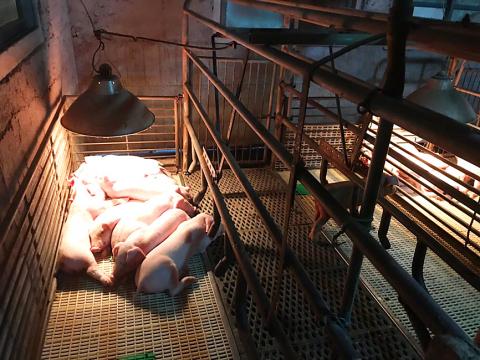Taiwan has not yet received an invitation to the World Organisation for Animal Health’s (OIE) regional conference on African swine fever that is to take place in Beijing on Monday, but Vietnam is seeking the nation’s help in testing the virus, the Council of Agriculture said yesterday.
The highly contagious disease has not been found in Taiwan, but the government has been implementing preventive measures since China first reported an outbreak on Aug. 3 last year, followed by Vietnam on Feb. 20 and Cambodia on Wednesday.
Although Taiwan is an OIE member, China, as the conference’s host nation can decide which nations to invite, council Deputy Minister Huang Chin-cheng (黃金城) said.

Photo: Chen Hsin-yu, Taipei Times
The council on Wednesday wrote to the OIE to request permission to participate, but has not yet received a response, he said, adding that it is no stranger to Beijing’s “petty actions.”
If Taiwan receives an invitation at the last moment, officials have made related preparations, including a list of non-governmental and official attendees, Bureau of Animal and Plant Health Inspection and Quarantine Director-General Feng Hai-tung (馮海東) said.
Information exchange at the conference is important, as Taiwan can learn from other nations that have reported outbreaks to make early preparations in the event that the disease enters Taiwan, he said.
Even if the nation is barred from the meeting, it would still join the OIE’s annual conference scheduled for next month in Paris, Feng said.
It is not clear how much information Beijing would share at Monday’s meeting, so it would not be that regrettable if Taiwan could not attend, Huang said.
The council has been collecting information about the disease through Taiwanese businesspeople and other channels, and learned of possible outbreaks in Vietnam and Cambodia prior to their official reports to the OIE, he said.
The council on Feb. 20 listed Cambodia, Laos, Myanmar and Thailand as high-risk areas for African swine fever, meaning that all carry-on luggage from the areas must undergo X-ray scanning at customs.
People caught illegally carrying pork products from areas infected with the disease within the past three years would face a fine of NT$200,000 (US$6,490) for the first offense and NT$1 million for repeated offenses, it said, adding that visitors who fail to pay the fines at customs would be denied entry.
The Vietnamese government last month asked Taiwan to share techniques for testing antibodies in pigs infected with African swine fever, showing that it has more confidence in Taiwan than in China for tackling diseases, Huang said.
The council is glad to offer help, but the collaboration should be further negotiated through foreign affairs channels due to the costs involved, he added.

A strong continental cold air mass is to bring pollutants to Taiwan from tomorrow, the Ministry of Environment said today, as it issued an “orange” air quality alert for most of the country. All of Taiwan except for Hualien and Taitung counties is to be under an “orange” air quality alert tomorrow, indicating air quality that is unhealthy for sensitive groups. In China, areas from Shandong to Shanghai have been enveloped in haze since Saturday, the ministry said in a news release. Yesterday, hourly concentrations of PM2.5 in these areas ranged from 65 to 160 micrograms per cubic meter (mg/m³), and pollutants were

Taiwan’s armed forces have established response protocols for a wide range of sudden contingencies, including the “Wan Chun Plan” to protect the head of state, the Ministry of Defense (MND) said today. After US President Donald Trump on Saturday launched a series of airstrikes in Venezuela and kidnapped Venezuelan President Nicolas Maduro, concerns have been raised as to whether China would launch a similar “decapitation strike” on Taiwan. The armed forces regularly coordinate with relevant agencies and practice drills to ensure preparedness for a wide range of scenarios, Vice Minister of National Defense Hsu Szu-chien (徐斯儉) told reporters before a

EVA Airways on Saturday said that it had suspended a pilot and opened an investigation after he allegedly lost his temper and punched the first officer several times as their plane was taxiing before takeoff at Los Angeles International Airport. According to a report published on Thursday by The Reporter, the incident occurred after the flight’s Malaysian first officer tried to warn the Taiwanese pilot, surnamed Wen (文), that he was taxiing faster than the speed limit of 30 knots (55.6kph). After alerting the pilot several times without response, the first officer manually applied the brakes in accordance with standard operating

NOT AN OPENING: Trump’s violation of international law does not affect China’s consideration in attacking Taiwan; Beijing lacks capability, not precedent, an official said Taiwanese officials see the US’ capture of the president of Venezuela as a powerful deterrent to Beijing’s aggression and a timely reminder of the US’ ability to defeat militaries equipped with Chinese-made weapons. The strikes that toppled Venezuelan President Nicolas Maduro signaled to authoritarian leaders, including Chinese President Xi Jinping (習近平), US President Donald Trump’s willingness to use military might for international affairs core to US interests, one senior official in Taipei’s security circle said. That reassured Taiwan, the person said. Taipei has also dismissed the idea that Trump’s apparent violation of international law could embolden Beijing, said the official, who was not